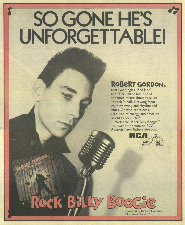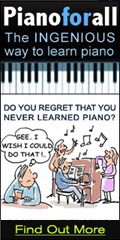![]()
  |

Rock Billy Boogie
Robert Gordon
RCA 3294
Released: March 1979
Chart Peak: #106
Weeks Charted: 12
 Just dig the cover photo on this album, where Robert Gordon makes with the spazz-splits, Elvis lip curl and mike-stand english afront a purple curtain with keyboards and drums and guitars and musical notes and dice even, all over it. No, this isn't a picture of the inside of the glass case in the New York Museum of Natural History labeled Bopcat Americana. This is Gordon being way out and frantic in frieze, Frieze, Bob, frieze.
Just dig the cover photo on this album, where Robert Gordon makes with the spazz-splits, Elvis lip curl and mike-stand english afront a purple curtain with keyboards and drums and guitars and musical notes and dice even, all over it. No, this isn't a picture of the inside of the glass case in the New York Museum of Natural History labeled Bopcat Americana. This is Gordon being way out and frantic in frieze, Frieze, Bob, frieze.
There are twelve songs on Rock Billy Boogie. Ten of them are old, and two of them involve Gordon and some friends borrowing clichés from other old times so as to pay tribute. Gordon's quite a tributeer, in fact. What he isn't is a real rock & roll singer. Because if he were, he'd take a chance once in a while. It's really a marriage made in heaven, he and ace transatlantic guitarist Chris Spedding, another prize hot dog who can play just about anything demanded in any style and has a soul that's all varnish.
 Click image for larger view. |
One burning question does remain, however. Will they show him only from the waist up on The Merv Griffin Show?
- Lester Bangs, Rolling Stone, 6-28-79.
Bonus Reviews!
In George Lucas' American Graffiti there's a scene in which the coolest greaser in town is cruising a the strip in the company, much to his dismay, of a fourteen-year-old bobby-soxer he has accidentally been saddled with. The radio is on, and suddenly there're the Beach Boys doing one of their early hits. The greaser turns it off in disgust, the nymphet turns it back on, and they begin to argue. She thinks the Beach Boys are "bitchin'." Our hero, however, does not. "I can't stand that surfing shit," he tells her. "Rock-and-roll's been going downhill ever since Buddy Holly died." That greaser is clearly Robert Gordon's spiritual cousin.
Now, Gordon is hardly the first musician to attempt to resurrect, singlehandedly, a musical idiom that almost everyone else had dismissed as hopelessly old-fashioned (think, for example, of earnest, academic old John Mayall, who for twenty years has been churning out earnest, academic imitations of black urban blues), but he is certainly working any style you could name. Next to him, in fact, the Forties-swing pastiches of even as skillful an outfit as the Widespread Depression Orchestra sound like the work of studio cats on a busman's holiday. For Gordon, rockabilly is not merely a minor, obscure, sub-genre of early rock-and-roll; it is, for all intents and purposes, a religion, and his career is nothing less than missionary work.
I know that sounds, at least on paper, positively deadly, and, in truth, a lot of Gordon's recorded output up till now has been just that. Sure, he knows the stuff cold and obviously loves it, but so does Sha Na Na, and nobody in his right mind has ever accused them of becoming more than a pale carbon of the Fifties masters they emulate. Gordon's problem was actually a lot bigger since, unlike Sha Na Na, he maintained not the slightest ironic camp distance from the music. Which means, as Billy Altman has observed, that whereas the rockabilly rebels who created this stuff spent most of their careers unconsciously trying to work the rawness out of their material, Gordon, with his note-for-note remakes, was consciously struggling to work it back in.
Further reading on Super Seventies RockSite!: |
Perhaps it's a fluke, a one-shot, secondhand masterpiece comparable to the single brilliant blues album John Mayall did with Eric Clapton years ago. Or perhaps it's the beginning of a new rock-and-roll legend that will ultimately outstrip those of Gordon's influences. Frankly, I don't care either way, and neither should you. Rather, you should grab a copy of Rock Billy Boogie immediately, and, in the words of Elvis' "Milkcow Blues," "get real, real gone for a change." You'll be a better person for it.
- Steve Simels, Stereo Review, 5/79.
Musically this is as fine a collection of rockabilly as could be put together. Gordon's vocals occasionally lack passion but then he's not a teenager any more. His voice is otherwise perfect for the genre conjuring up Elvis and Gene Vincent as well. Chris Spedding, Rob Stoner, Howie Wyeth and Scotty Turner supply impeccable instrumentals. Best cuts: "Wheel Of Fortune," "Rock Billy Boogie," "Black Slacks."
- Billboard, 1979.
Gordon's nouveau rockabilly has always been a mite slick and a mite fast, and this is his best album because he's no longer hiding it -- his blown notes are just blown notes, not stigmata of authenticity. Credit Chris Spedding's unnaturally adaptable guitar, which drives the music more aptly than Link Wray's raw protohippie licks, authentic though they may have been. I mean, half the time Gordon actually sounds as though he belongs there. Blows some notes, though. B
- Robert Christgau, Christgau's Record Guide, 1981.
![]() Reader's Comments
Reader's Comments
No comments so far, be the first to comment.
